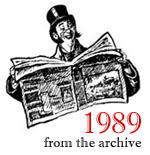
Orestes Brownson’s Christian Radicalism
GRASPING THE UNIVERSAL THROUGH THE PARTICULAR
Orestes Brownson’s search for a satisfactory synthesis of politics and religion took him through so many twists and turns, down so many blind alleys, that it almost defies attempts to find a thread of consistency or even a pattern at all. Once described by Emerson as a “Cobbett of ascribe” (thanks to his rousing essay, “The Laboring Classes”), Brownson ran through a considerable range of Protestant sects — Presbyterian ism, Universalism, free thought, Unitarianism — before converting to Catholicism in 1844, and his political views followed a similarly erratic path. An Owenite socialist in his 20s, he later embraced the cause of working-class radicalism, briefly called himself a Jacksonian Democrat, soured on democracy after the log-cabin, hard-cider campaign of 1840, allied himself for a time with John C. Calhoun, and finally settled down as a Catholic conservative in the last 25 years of his life.
Since Brownson never kept his opinions to himself or thought them over in private before committing them to print, he “gained a sneer,” as he himself noted, “for my versatility and frequent changes of opinions.” He conducted his self-education in public, in the pages of magazines written entirely by himself. “The debate in my mind,” he wrote in 1842, “has been going on for the last ten years.” In fact it had been going on a good deal longer than that; nor did it stop with his conversion. As a Catholic, he continued to fill Brownson’s Quarterly Review with dense, erudite, prickly, opinionated articles on theology, ethics, epistemology, law, and politics. More Catholic than the pope, he sometimes had to be disciplined by his clerical superiors, especially when his frequent pleas for the reunification of politics and religion threatened the precarious truce between the Catholic Church and the state. The Catholic hierarchy understood its acceptance of church-state separation as the essential condition of the Church’s existence in America, and Brownson’s zeal for a public religion proved not a little embarrassing.
His inability to accept the separation of politics and religion provides the key, I think, to Brownson’s otherwise baffling career — the one element of stability and continuity running through all his inconsistencies and contradictions. From the beginning, he took the position that religion is far too important to remain a purely private concern; no doubt it was this conviction, in part, that led him to make such a public issue of his own religion, doubts and all. Even during his free-thought phase, he insisted that society needed religion more than ever — the religion of humanity, as he then hoped, that would take the place of Christianity. By the mid-1830s, he had repudiated the man-made religion advocated by the Saint-Simonians. He wrote his New Views of Christianity, Society, and the Church (1836) expressly to refute the contention that society needed a new religion in place of the old one. In the same work, however, he continued to attack the separation of church and state, which rested, he now argued, on a philosophical separation of spirit and matter, mind and body, that ran counter to the doctrine of the Incarnation and to the whole Christian tradition. Three years later, he criticized the idea that clergymen should not “meddle in politics” on the grounds that “all man’s duties are intimately connected,” that “religion and politics run perpetually into one another,” and that “a religion which neglects man’s social weal is defective in the extreme,” while a politics set apart from religion degenerated “of necessity into Machiavellism.” In 1842 he said that it was “wrong, wrong” to cite medieval history on the dangers of clerical oppression, as if it were improper for secular authorities to submit to spiritual authority. On the contrary, “it was well for man that there was a power above the brutal tyrants called emperors, kings, and barons, who rode roughshod over the humble peasant and artisan.”
The inseparability of politics and religion, as Brownson conceived it, by no means implied the desirability of an official consensus or civic religion. He wanted a “powerful and living synthesis,” not an “imbecile eclecticism.” In the 1830s and 1840s liberal Protestants, most of them Whigs, urged the churches to abandon sectarian squabbles and to unite around a few ethical precepts common to all of them, which could serve as a national creed. Without moral discipline, they feared that competitive individualism would tear society apart. The separation of church and state was a highly desirable arrangement because, in their eyes, it kept divisive and inconsequential controversies about doctrine out of politics and allowed the churches to devote themselves to the more important work of moral reform. Temperance, thrift, honesty in business, proper work habits, provision for the poor, prompt payment of debts, respect for women, protection of Indian rights: these were the crying needs of the day, as the Whigs saw them — to which the “conscience Whigs” would have added the gradual emancipation of slaves, followed by their resettlement in Africa. This ambitious program presupposed a basic moral consensus, which Whigs hoped to propagate through charitable organizations and other interdenominational agencies — the “voluntary associations” so highly praised by Tocqueville (who relied on the Whiggish mercantile and civic elite for many of his impressions of America) — and above all through the common schools. The school system envisioned by Horace Mann and other reformers was meant to serve as the main source of social morality.
You May Also Enjoy
Literature offers many examples highlighting the fact that, in very subtle ways, men can be victimized -- even “tortured” -- by the fair sex.
Americans do read — street signs, job applications, directions for installing video games, glossy magazines. But, sad to say, most Americans do not read literature.
The novelist calls characters into being and prods them forth toward a closure which, once reached, turns all that came before radiant with meaning.

